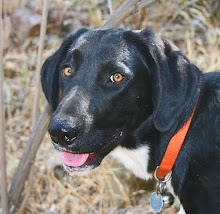Adventures in camera trapping and zoology, with frequent flashbacks and blarney of questionable relevance.
About Me

- Camera Trap Codger
- Native Californian, biologist, wildlife conservation consultant, retired Smithsonian scientist, father of two daughters, grandfather of four. INTJ. Believes nature is infinitely more interesting than shopping malls. Born 100 years too late.
Tuesday, April 27, 2010
Curious climbing mouse
You might recognize the location from the previous post.
For reasons known only to it, the Peromyscus or white-footed mouse shimmied up the re-bar and returned to ground zero.
Cute, but the curious thing is the use of the tail.
It is semi-prehensile.
It can't seize and grip like a true grasping organ, but it can wrap around a twig, stem, or a piece of re-bar to give the body a small added measure of support.
Some climbing rodents, like most species of prehensile-tailed porcupines, Coendou have true grasping tails.
But most arboreal rodents have tails that are balancing organs.
In general, the more arboreal the rat or mouse the longer the tail, but only up to a point of course.
They also have the ability to wrap the tail around a twig in an incomplete spiraling coil.
Thus the semi-prehensile tail that comes into play as the mouse inch-worms down the rod.
When it relinquishes the grip of the hind legs to move forward, there's a danger of the mouse's big butt swinging out and away from the perch.
The semi-prehensile tail keeps the mouse's center of gravity close to the perch.
You have to admire their versatility.
Subscribe to:
Post Comments (Atom)


4 comments:
Congratulations on the wonderful photos.
Pole dancing mouse style?
Wonderful -- wish I had thought of that!
Dear Codg
That settles it. You'll just have to come down here with all your gear and look at our rodents. We have several around here that use their tails in just this way, but we need to you to photograph them..
Mr S
Really do need to hit the outback, Dave. Thanks for the invite.
Post a Comment